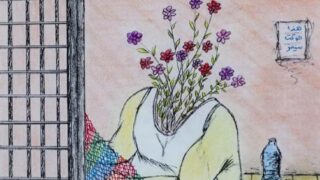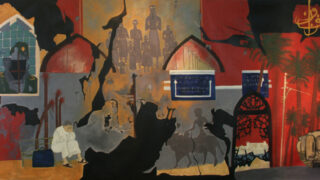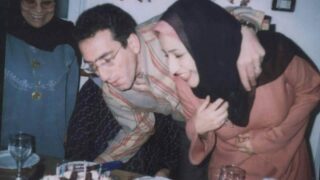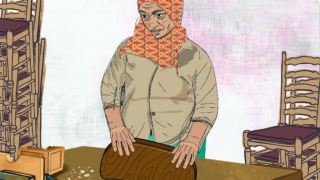
This publication has benefited from the support of the Rosa Luxemburg Foundation. This text may be reproduced in part or in full, provided the source is acknowledged.
- This is my life, Thaat, and that’s what I got to give. Or is nakad (1) all you seek?
-My life with you is nakad, Abdo, so much nakad!
This is the very recurring response, so normal and common, that most men lean against as the answer and essence of understanding and rhetoric, and which most women consider arrogant presumptuousness. In the above excerpt from Sanaallah Ibrahim’s novel Thaat, which was then turned into one of the most important Arabic drama series (2) in recent years, this scene was the “peak” and epitome of the plot. For two reasons: first, the series creators allowed the “heroine” the space and right to burst out, and second, they had her “husband” transcend the common reaction that a considerable group of men, regardless of background, resort to, which is “violence”, be it verbal or physical.
On the other end of Thaat’s spectrum, who managed to voice herself, readers in the past circulated a sad story by an anonymous writer, titled Headless. It tells the story of a woman with a number of arms and legs, but no head. She carries out dozens of tasks like that. This is how most prefer a woman to be – wordless or voiceless, even if she had the most beautiful face. And even as some might try to help her by placing a bouquet of flowers around her neck, they do so on the condition that they can decapitate her head in case it grew unnoticed, while being watered, or started to pose unwanted challenges and pronounce unwarranted criticisms.
Decapitation methods are many, but its easiest, and most effective, is by “injection under the skin”, which seeps into the minds and souls to create a “typical image” or, rather, a “dictatorial statement” that the patriarchy, in all its facades (a husband, father, mother, brother, employer, or children) uses to silence women. Whenever a woman thinks of penetrating the system, she’s accused of making things up, and the sword of judgement deems her nakadiyeh.
Statistics and evidence
In a statistical study prepared by the National Centre for Social and Forensic Research in 2018, titled The Mental Picture of the Egyptian Woman, and which targeted a sample of 3000 people (1500 male and 1500 female), who live in both cities and rural country, considering it a representative sample of Egyptian society, there was an attempt to illustrate this picture by measuring the social perception of some of the positive and negative characteristics connected to women, as well as questioning the number of social, political, and economic rights.
Plain numbers are listed here first, followed by evidence:
77 percent of females and 66 percent of males see that women are controlled by emotion. 37 percent of females and 58 percent of males see that women constantly need to have a man in charge. 17 percent of females and 37 percent of males think that women are incapable of making decisions. 56 percent of females and 38 percent of males believe that women cannot face up to tough situations.
The collection of characteristics related to a woman’s character and capacity of independence does not show women as nakad-prone and unbearable! Rather, men acknowledge that women need them, and so do women, according to the figures, which cancels the concept of nakad. More importantly, in this first round of statistics, it appears that women are in close agreement in thinking that they need men to “lead” (and not only that, women respondents topped men in agreeing with men’s statements more than men themselves in two of four domains!). This might indicate that women project an image of themselves that shows them as somehow weak, in need of a man to be in charge, or at least are weaker than men in the decision-making realm. This means that the patriarchy and machismo have women for members too, and is not at all exclusive to men.
In that sense, many mothers, for instance, participate in oppressive practices, and in adopting patriarchal values. This comes as no surprise as, were it not for that, that desired human equality would have been achieved. That is, women have yet to liberate their minds and their own self-estimation; so long as they defend common values and practices in society, patriarchal and masculine par excellence, they will always finish second.
She wakes up early morning, out of breath, running around serving breakfast, preparing the kids to leave at her mother’s house, along with her mother’s reprimands: “Enough with your spoiled little girl mentality and complaints”. She has no time to think. She then, once more, comes back home, out of breath, to slice onions and garlic, do the laundry and help the kids with their homework. Then, she would save up some pounds from work to buy a sewing machine to help increase her revenues.
She goes to bed exhausted, as her husband went to work, came back at four in the afternoon, to sit back, relax, read the newspaper, and go to his café. He then comes back at night insisting that she gives him his “rightful dues”, and not to deprive him of that pleasure just because she’s tired. She often does it reluctantly, without ever managing to forget that horrific moment that severed her soul as her mother forced her to undergo circumcision with a midwife’s scalpel.
As regards internalising negative perceptions of themselves, topped by nakad, percentages were as follows:
49 percent of females and 69 percent of males see women as chatterboxes. 23 percent of females and 37 percent of males see that women usually talk about frivolous and insignificant things. 22 percent of females and 45 percent of males believe that women are nakad-prone. 16 percent of females and 22 percent of males think that women are “controlling”, while 48 percent of females and 41 percent of males think women to be “jealous”. And finally, 11 percent of females and 18 percent of males believe women to be “negligent” in raising their children.
Egypt: The Women and the Sea
05-04-2020
The high percentages related to women’s self-perception and convictions in this second part of the statistics indicate, in turn, that they have internalised their inferiority, or whatever is commonly believed to be their negative characteristics. For instance, 49 percent of females (half!) see that women are “chatterboxes”, which is more offensive than “talkers”. As for the rest of percentages, they came quite close among both female and male respondents, which does not indicate any division of consciousness between them.
And yet, what makes a woman jealous and nakad-prone in both men’s and women’s eyes? Statistics tell the following:
56 percent of females and 28 percent of males attribute this to “frustration”. 55 percent of females and 64 percent of males think that’s the case due to “women’s own dissatisfaction with themselves”. 31 percent of females and 34 percent of males think it’s because of “disharmony in a couple”, while 30 percent of females and 32 percent of males think it’s related to “not satisfying her needs”. 20 percent of females and 25 percent of males refer back to “not believing in marriage”, while 59 percent of females and 29 percent of males revert back to “the husband neglecting her”. 37 percent of females and 22 percent of males point at “boredom”, while 41 percent of females and 20 percent of males believe it’s about “mistreatment”.
In parallel, what were the findings of the same group of respondents when asked about the positive characteristics and nature that Egyptian women have?
69 percent of females and 63 percent of males see that women can handle responsibility. 54 percent of females and 46 percent of males believe women are “compassionate”. 53 percent of females and 42 percent of males think women are “giving”. 50 percent of females and 40 percent of males think women are “fighters”. 44 percent of females and 40 percent of males believe women are “faithful”. 42 percent of females and 33 percent of males think women are “well organised”, while 47 percent of females and 36 percent of males think that women are “make sacrifices”.
These numbers expose that fabricated concept of a nakadi woman. How can women be nakad-prone while also being “fighters”, “giving”, and “un-controlling”?
Women internalize a certain image of themselves that indicates they’re weak and in need of a man to be in charge, or that they’re at least weaker than men in decision-making. This means that the patriarchy and machismo have women for members too, and is not at all exclusive to men. In that sense, many mothers, for instance, participate in oppressive practices, and in adopting patriarchal values.
How could one read these figures? Researchers delved into the drawn findings and used the expression “a context of contradictions”. According to the questionnaire, no less than 45 percent of this society see “women” as nakadi, frivolous, chatterboxes, and jealous, but also simultaneously as responsible, compassionate, giving, and fighters.
Not only that, but one could even read more detailed implications. For example, the negative characteristic that was least on men’s minds was “authoritarianism”. However, while they don’t see in women an urge to control and dominate, they see an inclination for nakad. The main reason, in their opinion, is “lack of contentment” or “being ungrateful”. This gives the impression that women are inconsiderate of the overall conditions and the external stresses that men face. However, at the same time, most decide to side with women, considering her sacrificing and a fighter. Does this not give yet another way for bringing up “discontentment” as they called it? Or is it related to the other reasons which women chose, topped by “frustration” and “a husband’s negligence”?
Then, the most urgent question, which requires an answer, is the reasons behind that frustration, and what women were looking for within society but couldn’t find?!
According to the Marriage and Divorce publication, issued by the Central Bureau for Mobilization and Statistics for the year 2020, we could note that the number of marriages had exceeded 900 thousand, whereas the number of divorce cases is bigger than 225 thousand. That is, rates and ratios indicate around 25 percent between marriage and divorce.
In a general statement, Nadia Halim, the study’s supervisor, prepared over the course of one year within the biggest official institution, said: “The study showed the extent to which women needed a “model” that society sought to instil, within all its institutions. Everything monitored indicates that Egyptian women remain in the “follower’s” position, and must be independent to find real solutions to many problems, like population growth, early marriage, deprivation of basic rights, which helps women in the long term -and without decontextualizing the socioeconomic problems that society faces as a whole- in creating a mental image that is more equitable and just, and more responsive to changes”.
Courtrooms and documentation
Not many admit to the abovementioned, and rather see in academic interpretations prejudices. However, what do marriage and divorce figures predict in Egypt?
According to the Marriage and Divorce publication, issued by the Central Bureau for Mobilization and Statistics for the year 2020, we could note that the number of marriages had exceeded 900 thousand, whereas the number of divorce cases is bigger than 225 thousand. That is, rates and ratios indicate around 25 percent between marriage and divorce.
The average age for women in marriage is 20-25 years old, and 30-35 years old in divorce. The first and undisputed divorce method is khale’, which is the divorce in Islam that is initiated by a wife, as per the report. 104 thousand women (amounting to 88 percent of divorce cases) thus resorted to relinquishing all their rights and divorcing their husbands in court to end the marriage. Only 564 women could prove conjugal violence, while the number of divorce cases due to the husband’s illness did not exceed 11 cases, or 4 cases due to imprisonment.
Moreover, upon divorce, the average marriage span is between 5 to 10 years.
Multiple studies of official and unofficial institutions have stated that economic reasons are a key issue. One study by the National Women’s Centre, based on a sample population of 2343 women, found that these women had managed to get a categorical and final rule of khale’, due to the key issue being economic reasons, and were related either to the husband not assuming responsibility, or trying to blackmail women and get a hold of her salary. This is the same result that the Egyptian Office of the Mufti reached in a study based on the communications and inquiries they receive before divorces are filed for.
This goes hand in hand with the interpretation noted in the figures on the relationship between divorce rates and women’s educational and social levels and status. The annual census indicates that ranking first are the illiterate (whereby 299 thousand women from this category got married in one year, while 72 thousand divorced got divorced that same year). Ranking second were women with higher education (in one year, 239 thousand women of this category got married, while 55 thousand women got divorced).
A lower level of education means poverty, which confirms that divorce rates are not caused by women’s increased awareness and independence, who therefore decide that they cannot accept any injustice, but rather that the situation is so oppressive and unbearable to the point where women are made to resort to divorce.
On the other hand, the report noted 133 thousand men who got married with divorced women, which equals nearly double the number of women who were ok with marrying divorced men – 72 thousand women. Perhaps statistics imply that women prefer to avoid a second miserable attempt than remarry! In the meantime, a man’s decision to remarry does not imply that he thinks women are nakad-prone in their nature or oppresses he “who gives his best” without matching it by her support, or being “ungrateful”. A woman who files for divorce then might seek to rid herself of the “nakad of her life”, in which she fails to find the minimum amount of equality or justice, fleeing for her life and her children’s, and starts to assume responsibility without (controlling patriarchal) pressure, having lost the romantic dream of a life based on “amity and partnership”.
Thaat’s story
As for Thaat, she no longer cares, ever since the moment she broke down, to look for answers or provide them to any other party involved. Her main raison d’être became, whenever her anger died down, for this reality, which pushed her to scream following ten years of marriage, to change.
One study by the National Women’s Centre, based on a sample population of 2343 women, found that these women had managed to get a categorical and final rule of khale’, due to the key issue being economic reasons, and were related either to the husband not assuming responsibility, or trying to blackmail women and get a hold of her salary. This is the same result that the Egyptian Office of the Mufti reached in a study based on the communications and inquiries they receive before divorces are filed for.
The journey started with her choice of the first man who asked for her hand in marriage out of fear, despite her young age, of becoming an old maid. She accepted his request for her to quit university, for excuses like dignity and jealousy, despite knowing that the real reason behind his request was in fact his jealousy of her prospective degree, to which he has no access. He promised her what would become her only dream: a happy home. And yet, less than five years into the marriage, she found herself waking up in the early morning, out of breath, running around serving breakfast, preparing the kids to leave at her mother’s house so that she could go to work, after which she takes not one, but two buses.
She takes the same route back home, carrying the kids on her shoulders, along with her mother’s reprimands: “Enough with your spoiled little girl mentality and complaints”. She has no time to think. She then, once more, comes back home, out of breath, to slice onions and garlic, do the laundry and help the kids with their homework. Then, she would save up some pounds from work to buy a sewing machine to help increase her revenues. And finally, she goes to bed exhausted. All the while, a husband went to work, came back at four in the afternoon, to sit back, relax, read the newspaper, and go to his café, then comes back at night insisting that she gives him his “rightful dues”, and not to deprive him of that pleasure just because she’s tired. She often does it reluctantly, without ever managing to forget that horrific moment that severed her soul as her mother forced her to undergo circumcision with a midwife’s scalpel.
She looks at him and remembers everything that’s happened, every bitter moment. How does he not share any of these burdens? How has he given up on all his promises of continuing his education, getting a promotion at work, and providing her with some comfort by earning more money? She looks at the walls around her, as worn out as she has become, holding everything in, until an “insignificant” moment happens, as per her “husband’s” remark, who had just returned from work. It’s a moment that helps her finally get what she dreadfully needed – to “burst” out without bothering with the implications.
Abdelmajid wasn’t a hardworking man, fighting like many million other similar men who suffer from the grave economic conditions in Egypt. All the same, he wasn’t a mighty cruel man, so she never suffered what million others suffered – like cruelty, sarcasm, humiliation, cheating, and denial.
In any case, he, and them, remained the sons of a culture that disregards such a massive amount of rights, of which women are deprived solely because of their “gender”. Thus, if they ever think of saying no, women are branded, those very women who were queens in their husband’s eyes on their wedding day, by that eternal stigma: a “nakadi woman”.
The content of this publication is the sole responsibility of Assafir Al-Arabi and Rosa Luxemburg Foundation cannot accept any liability for it.
Translated from Arabic by Yasmine Haj
Published in Assafir Al-Arabi on 16/12/2021
1- Nakad, in Arabic, is an expression that refers to someone who is cranky, difficult to please, a troublemaker, and a seeker of misery and unpleasantness in situations.
2- The film’s scenario and dialogues were written by writer Mariam Naoum.







